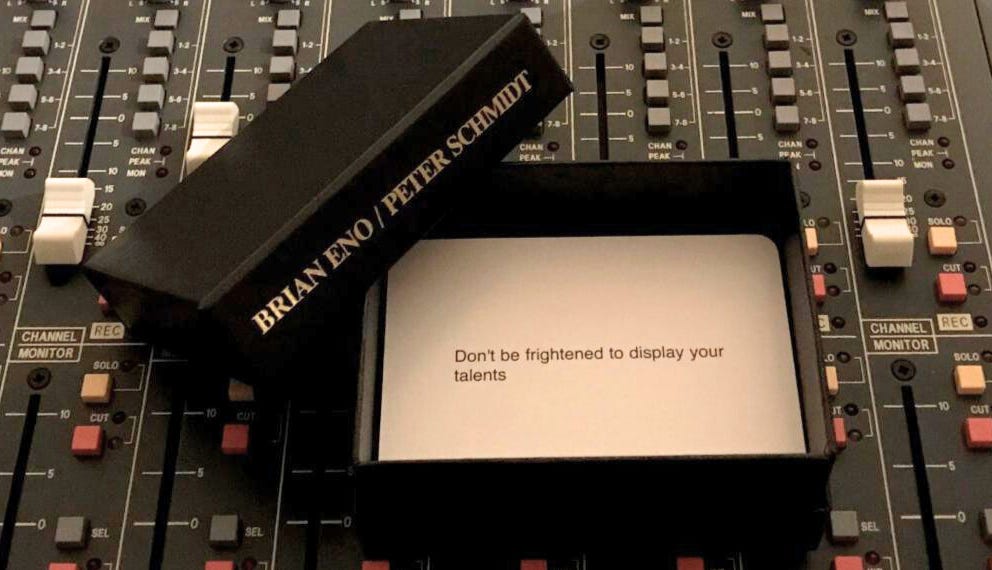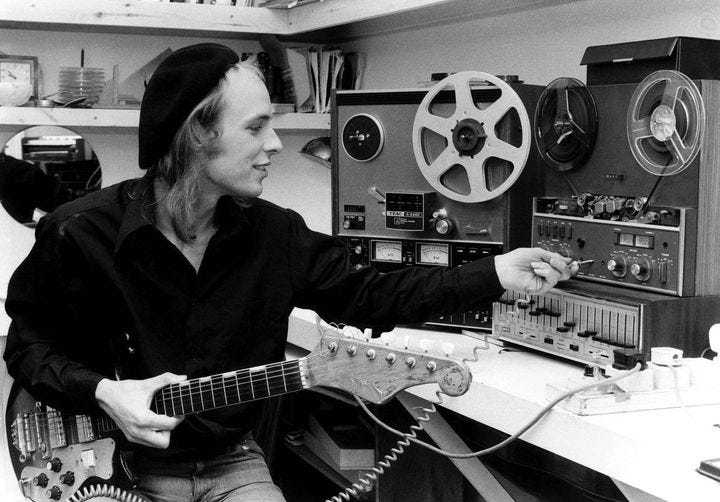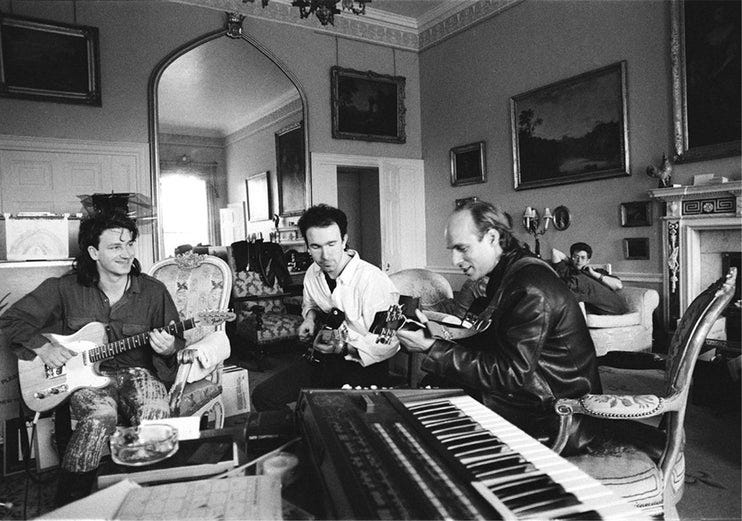I've been collecting musical knowledge like a cosmic magpie—teachers, classes, books—all forming this weird, nonlinear web in my brain that grows and shifts like some trippy organism. Singing, breath work, how to write a hook, lyric structures, chord progressions, music theory, piano, guitar, song forms, Songwriting for Dummies!, production, mastering, jungian archetypes… the list spirals, overlaps, and goes on and on.
When the School of Song announced Brian Eno was teaching, I pounced. Not because I worship his albums (though respect where it's due), but because the dude's brain operates on a completely different frequency than my other teachers.
He doesn't just think outside the box—he questions why boxes exist at all, then builds a geodesic dome instead. Eno tinkers with art and reality in ways that are expansive, befuddling, and occasionally confusing as hell.
I wanted someone who wouldn't just teach the standard curriculum with their personal spin, but who'd slam dance on top of any semblance of what "music education" should be. Someone who'd force my brain into new neural pathways. Spoiler alert: I was not disappointed.
Cosmic Lessons from the Eno Universe 🛸
What Do You Really Like?
Much like Rick Rubin, Eno believes the artist's main job is knowing what genuinely lights you up from within—not what you think should excite you, what others expect from you, or what the audience wants you to do. You're this beautiful, unique antenna receiving signals that only you can catch because of the special blend of experiences, traumas, identity, and sensitivities that have shaped your heart and mind.
Think about it: nobody else has walked your exact path, felt your specific joys and sorrows, or processed the world through your particular soul. That singular perspective isn't just interesting—it's essential. It's what allows you to pick up on frequencies that would otherwise go unheard in the universe.
Your genuine taste—all those things that make your spirit pay attention—isn't something to apologize for or water down. It's precisely why we need your voice. There is no other you. We're literally counting on you to bring in that signal that only your weird-ass antenna can receive.
Artists Build Alternate Realities
Eno sweetly flipped the "art mirrors truth" concept on its head. We're not truth-tellers—we're world-builders creating alternate realities that make people wonder: "Do I want to live here?" Whether it's a dreamy utopia or something deliciously grotesque, we're crafting spaces for people to try on and explore who they might become in that reality. We're astral architects building worlds that don't exist yet… but should. Or worlds that absolutely shouldn't exist but need to be witnessed as warnings. Either way, we're not simply mirrors holding up reflections—we're portals to what could be, playing in the quantum field of possibility and refusing to worship what is.
Consider Ditching the Chord Obsession
Western music has us hooked on chords, but Eno reminded us many beautiful traditions weave melodies and riffs without relying on chord changes. It takes a special kind of confidence to let a groove breathe and evolve without changing chords every four beats. Your song has permission to flow differently.
Need more concrete inspiration? Moroccan Gnawa, Indian Ragas, West African Kora music, and even James Brown — Sex Machine and Get Up Offa That Thing being a great examples — all will plunk on one chord and groove while riffs and lines go over it. Western songwriters might have difficulty sinking into this alternative way of perceiving song structure, but practicing it might break open your songwriting into new stratospheres and unexpected places.
Free the Singer
Eno shared this beautiful story about working with U2 on their album Achtung Baby. When they were recording, I think is was, "Mysterious Ways," Bono was struggling to capture the right vocal energy in the isolation booth. You know the scene - singer trapped in a little soundproof box, headphones clamped to their ears, trying to conjure stadium-level passion while staring at foam walls.
Eno, being the brilliant disruptor he is, halted everything. He called Bono out of the booth and told him to just sing right there in the control room with everyone else. When someone mentioned the technical problem of "bleedback" (where the music playing in the room gets picked up by the vocal mic), Eno basically said "to hell with it!"
The result? Bono immediately delivered a passionate, concert-worthy performance because he could move freely, feel the music vibrating through his body, and feed off the energy of everyone else in the room. The lesson is beautiful in its simplicity: the small amount of audio bleed is a tiny price to pay for capturing that raw, physical connection to the music. Without that powerful, emotionally resonate lead vocal the song falls flat, so go ahead and capture it the way the vocalist needs to sing, like a real human being.
Eno also suggested that singers in the recording studio should consider holding the microphone in their hand rather than being stuck at a stationary stand, because we naturally control our volume better with our hands than by awkwardly moving our faces closer or farther from a fixed point. Your body knows how to sing - give it room to participate in the process. The sterile, technically "perfect" environment might actually be suffocating your best performances.
Melody Drops In From Elsewhere
You don't force melody—it arrives like a gift, fully formed from somewhere beyond ordinary thinking. You might gently shape it after, but melody isn't something you squeeze out of your brain. It's received. Where from? Brian leaves it to your own belief system and your heart to know the answer, but the key is being open to these beautiful transmissions, and you’ll probably save yourself time and frustration by not sitting yourself down to “create a melody” the same way you might approach other aspects of song creation. Some elements can absolutely be approached systematically, technically, methodically, but melody seems to arrive on its own, in its own time and usually fully formed.
Music Needs a New Name
Theatre evolved into film/cinema/movies as technology transformed it. But "music" is still just music, even though recording has utterly changed what it can be. Live performance and studio recording have become such different creatures they deserve their own names. We're working in a medium with language that hasn't caught up to its range and complexity.
"Assume Everything You Make is a Work of Complete Genius You Don't Quite Understand Yet"
This might be the most loving perspective shift ever. Stop second-guessing your beautiful weirdness. Trust that your creative impulses are valid even when they seem strange. The confusion might just be that your genius is ahead of your understanding.
Slow Down in the Morning
Eno gently suggested spending your first 20 minutes of each day intaking nothing. No phone, no reading, no food—just quiet beingness. Listening and paying attention to what naturally arises from within, not through external stimulation. This practice helps you hear what naturally bubbles up from your soul. "The rate of distraction is faster than the rate of wisdom accumulation," he observed. Give your wisdom space to catch up.
I've tried this beautiful practice and honestly, it's challenging in the most worthwhile way. Our relationship with morning distractions—especially our phones—runs so deep. But the few times I've actually settled into this quietude? The most wonderful treasures have surfaced up from my subconscious. One morning, with nothing but my own thoughts for company, Depeche Mode's "Personal Jesus" popped up from somewhere deep within my memories, with it’s twangy guitar riff and the line “Reach out, Touch Faith” —a song I hadn't connected with in years.
That seemingly random offering from my inner DJ sent me exploring production techniques I'd never have consciously sought out. Your mind knows exactly what creative nutrients it's craving—if you'll just create the space for it to speak to you.
Backing Vocals Are Secret Invitations
Eno reported to our class that 80% of hit songs have backing vocals but only 20% of recordings have them (classic Pareto Principle). Backing vocals are so effective because they tell listeners where they belong in the story and where they should sing too. They transform songs from private diary entries into communal experiences we're all invited to share. Same with handclaps and finger snaps—they're like little "we see you" moments that bring people around the proverbial fire to tell each other stories, participating, joining in with the music. If you are aiming to create a song that is universal and welcomes the listener in, consider how you use backing vocals, harmonies, and human sounds like snapping and clapping.
Create in Multiple Mediums



Joni Mitchell considers herself a painter first, singer second. Eno, too, works in multiple mediums. Having different creative playgrounds keeps any single art form from bearing too much pressure and creates beautiful cross-pollination. Your pottery might hold the key to your songwriting block. Your photography might illuminate your lyrics.
When You Hit the Deadline, It's Finished
When asked how he knows when a song is finished. That's it. That's when you know the song is done. Now, release it to the world.
Lyrics Push Music to the Background
Eno demonstrated this with a beautiful visual experiment that stuck with me: he showed us a portrait of a girl in a blue tufted dress with ribbons in her hair, standing in a meadow. The figure was the clear focal point - we all naturally looked at her and the stream of inner questions about who she was, what was she doing, feeling, and going to next populated our minds. (I recreate the same effect for you here).
What happened next was magical. He revealed she was actually a cut-out and removed her from the scene.

Suddenly, the landscape bloomed with details none of us had noticed before - an Oak grove with dappled light, patches of wildflowers, hidden logs, the texture of clouds shifting across the sky, the mood and character of the place itself. The girl had dominated our perception so completely that we'd missed the entire world around her.
"This," Eno explained, "is what lyrics do to a song." Words naturally draw our attention, pushing the music behind them like that landscape. Sometimes this serves the song perfectly; sometimes it doesn't. The key is being intentional about this dance between sound and meaning.
I experienced this firsthand when Toro y Moi recently rereleased an album as instrumentals, and I was portaled into a completely different sonic experience. Without lyrics pulling my focus, I discovered musical textures, rhythmic conversations, and emotional landscapes I'd never noticed before. Both versions are beautiful and compelling, but they were completely different ways of directing my attention. As composers, we need to understand this power dynamic between words and music.
Nonsense Can Be Beautiful
Many songwriters begin with placeholder sounds before adding "real" lyrics. Eno lovingly suggested sometimes those original sounds should stay—don't force meaning when the vibe is already perfect. Some songs bloom fully with playful or seemingly meaningless lyrics. Think “Ob-La-Di, Ob-La-Da,” “Tutti Frutti”, “Da Do Ron Ron” or even “Bad Romance” by Lady Gaga. We all rejoice in singing these nonsensical sounds, imagine if these songwriters had tried to force something lyrically profound on us in their place in the name of being artistically pure? Ob-La-Di, Ob-La-Da might have ended up as something cliche and trite as “Oh my dear, it is true, life goes on!”
There is No "Must Do" Rule
Eno beautifully defies conventional wisdom about what makes a musician: he doesn't play instruments (at least not in any traditional sense), doesn't read musical notation, and rarely does live performances. The man literally started a song by whirling a microphone cord over his head until it made an interesting sound, then built a composition around that noise because it sparked his curiosity.
If you're thinking "I can't be a musician because..." — stop right there. Eno's entire career proves that your unique path is valid and worthy. There are no prerequisites to being a creative force in music. You can be a singer without a classically beautiful voice. A guitarist without guitar chops (hello, punk is a whole genre built against virtuosity). A recording artist who never sets foot on stage. A composer who works with sound rather than notes.
The music world is filled with self-appointed gatekeepers who'll tell you what you "must" do. But some of the most revolutionary artists in history — from Prince to the Ramones to Kate Bush — became iconic precisely because they ignored those rules and followed their curiosity instead. There are endless ways to engage with music creation, there is no one way to write a song or to have a music career. Don't let anyone else's definition of "musician" limit your expression or keep you from making the sounds that only you can make.
Oblique Strategies for Creative Breakthroughs

Brian Eno's "Oblique Strategies" deck are designed to shake up your creative process when you're stuck. Eno described fascinating studio sessions where each musician drew a card and had to follow its instruction for the day. Sometimes these instructions directly contradicted each other. One person might pull "Honor thy error as a hidden intention" while another gets "Work at a different speed."
The magic happens when these conflicting approaches collide. Instead of predictable collaboration, you get something wildly original that couldn't have emerged any other way. The cards force you out of comfortable patterns and into unexplored creative territory. It's not about finding the "right" approach—it's about discovering unexpected ones.
Archive Your Treasures
Eno and his team have developed a custom archive system for his decades of song making, he said that the archive system isn't just organization—it's respecting the mystery of creativity. That half-formed voice memo might be gold when revisited with fresh eyes and new skills. Recently, I finished a song in 8 minutes that I'd started 2 years ago. Two years and eight minutes of dreaming. But only because I'd honored that initial spark enough to save it.
If you’re songwriting, put some time and energy into creating a system to keep your ideas honored and respected through an organization that you can recall back to, incorporate, and revisit. Eno explained that sometimes bits of songs come through without the proper context, project, or venue…. until a later date. And suddenly what did not make much sense earlier, pops into place like a perfect puzzle piece.
The Revolution Is Already Here (It’s Just Not the One We Wanted)
Eno emphasized the urgent need for revolutionary protest music in these times. He said to us that the revolution is already here—it's just not the one we had hoped for. It's being led by populists and fascists instead of the peacekeepers, ecologists, artists, and dreamers.
This wasn't just cynical observation. Eno referenced Alexei Yurchak's fascinating book "Everything Was Forever, Until It Was No More," which explores how Soviet citizens simultaneously believed their system was eternal yet weren't surprised when it suddenly collapsed. The book examines how at "the moment of collapse it suddenly became obvious that Soviet life had always seemed simultaneously eternal and stagnating, vigorous and ailing, bleak and full of promise."
It’s easy to see parallels to our current moment, where established systems seem both immovable and precarious - where people are both upholding and subverting capitalism in the same breath, and from across the political spectrum.
Eno emphasized that revolutionary changes don't announce themselves with fanfare—they happen through subtle shifts until suddenly the entire paradigm collapses like a house of cards. The phases of revolution follow predictable patterns: impossibility, inevitability, and then obviousness. What seemed "impossible" yesterday becomes "inevitable" today and "obvious" tomorrow.
Our entire class got to work writing protest songs, I only got as far as turning the title “Everything Was Forever, Until It Was No More” into a melody and singing it repeatedly. I week later I sang it at open mic and just about scared the shit out of everyone there.
That phrase, Everything Was Forever, Until It Was No More, taps directly into our collective fears—our terror of change, our anxiety about losing control, our dread of mortality itself. All those illusions of permanence that prop up our sense of safety suddenly exposed.
But what makes those words truly powerful is their duality—the way they simultaneously terrify and potentially liberate. Yes, systems we thought eternal can collapse, but that also means spaces open for something better, more just. It speaks to the ephemeral nature of life itself, how beautiful and fleeting it all is, that we cannot cling to any moment or attachment because it’s bound to change. The words capture both the melancholy and freedom of having to exist only in the now.
In this moment of massive shift, as capitalism and institutional failures become impossible to ignore, these words remind us that rigid structures eventually give way. They invite us to ask: what will we build in their place? Who will we become when the "forever" we thought we knew transforms into something else entirely? The audience might not have been ready for that question, but it's precisely the one we need to be asking.
Open Source Songwriting
I leave my start here, a scratch demo of me and my guitar turning Alexei Yurchak’s phrase into a little melody, as inspired by Brian Eno. Anyone else want to take a crack at taking it farther? Adding to it, doing a different version, elaborating on the idea? I could see it being a groovy psychedelic dance song, or a hip hop anthem, or played by a quartet. Fair game, have at it!
I added a few tracks to the Spring Portal Playlist 002, inspired by a few happenings in my life this week. Briefly, the new additions come from:
Music Brian Eno had me reconsider and listen to with more attention
My collaborative article with
Ghosting Spotify: A How To Guide, some of the artists we mentioned are on the playlistI saw Sturgill Simpson live at the Greek in Berkeley this week, rippin’ good show that left me inspired but also wondering if any female musicians ever influenced Sturgill?
A branding exercise with one of my Azure Vault Studios clients, she introduced me to some cool artists as part of figuring out her brand story... fun right?
Whatcha waiting for babes? The Portal awaits….
Use this master button to find your preferred platform for listening, ranked from best to worst based on how they treat artists and the quality of their audio.
I’ll be seeing you through the portal 🌀
Little Door










Amen and amen and amen! So much good information here. Inspiring, thanks.
Awesome and super useful share Little Door, thank you x